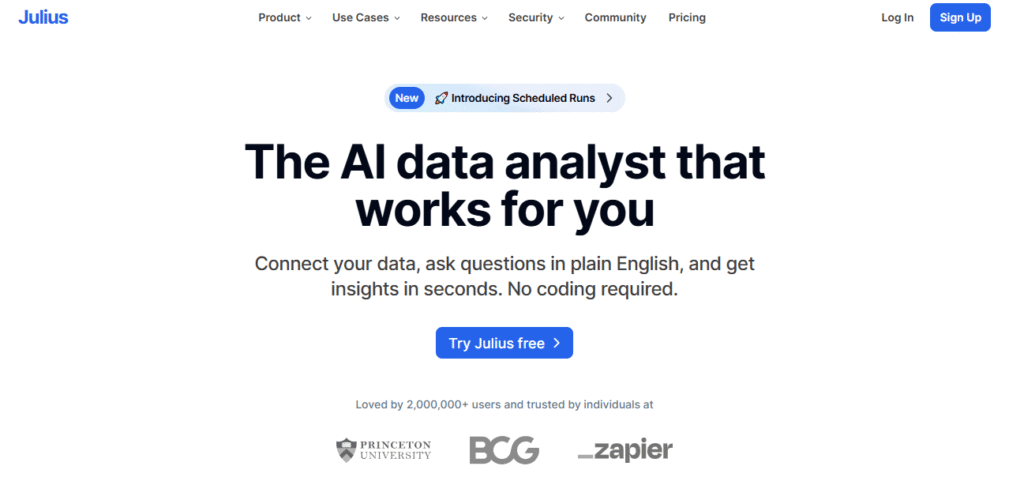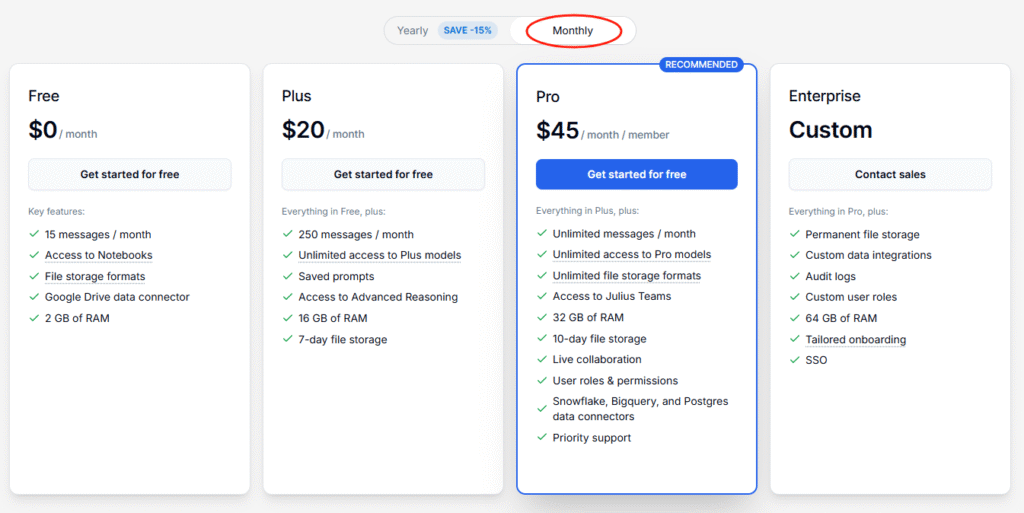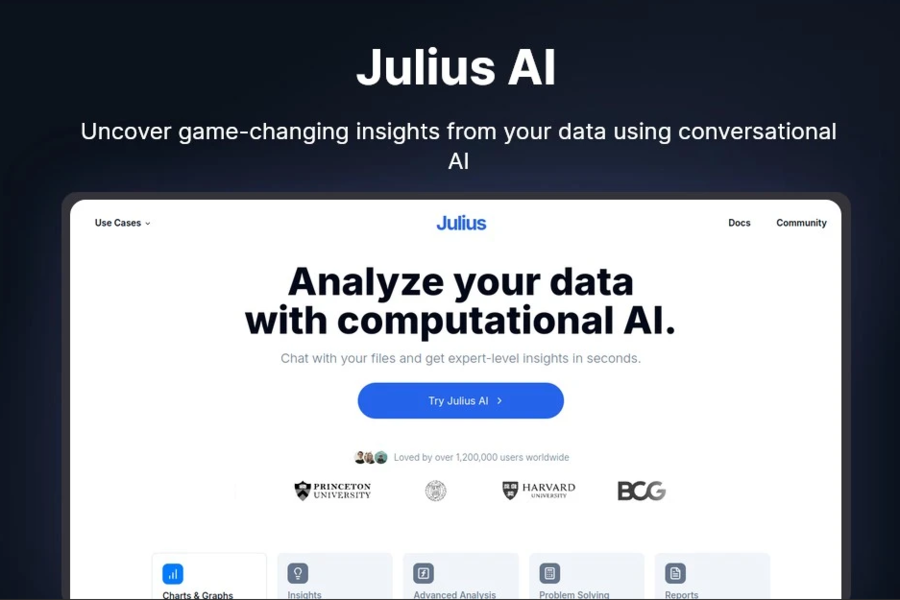Ever find yourself staring at a spreadsheet, feeling completely overwhelmed? You know those numbers hold the key to your next big decision—whether it’s for your business, a research project, or even a tricky homework assignment. But the thought of writing code, building dashboards, or wrestling with Excel formulas makes you want to shut your laptop and walk away.
What if you could simply ask your data a question—in plain English—and get a clear, actionable answer within seconds?
That’s exactly what Julius AI promises. In this detailed Julius AI review, we’ll explore whether this AI-powered data analysis tool lives up to the buzz—and, more importantly, whether it’s the right fit for you.
What Is Julius AI?

If you’ve ever wished you had a data scientist on speed dial, Julius AI might be the next best thing. It’s an intuitive, AI-driven platform that lets you analyze data using everyday language—no coding required. Simply upload your spreadsheet (from Excel, Google Sheets, CSV, or even PDF), type your question, and Julius gets to work.
Behind the scenes, Julius uses a fine-tuned AI model specifically trained for data tasks. It interprets your query, writes and runs Python code if needed, cleans your data, and delivers insights through visualizations, summaries, or even shareable reports. It’s built for people who need answers from their data—not a degree in data science.
Key Features of Julius AI
Julius AI is packed with capabilities designed to make data analysis faster, smarter, and more accessible. Here’s a closer look at what it brings to the table.
1. Instant, Intelligent Visualizations
They say a good chart can tell a story better than a thousand numbers—and Julius takes that to heart. Ask it to “show sales trends by month” or “compare marketing channels by ROI,” and it instantly generates clean, professional charts. No more fiddling with Excel settings or guessing which graph works best. Julius picks the right visual for your data and makes it easy to understand what you’re seeing.
2. Chat-Based Analysis
Gone are the days of memorizing formula syntax or query languages. With Julius, you engage in a natural conversation with your data. Ask follow-up questions, request tweaks to your charts, or dig deeper into specific metrics—all through a simple chat window. It’s like having a friendly data assistant who speaks your language.
3. Forecasting and Predictive Insights
Wondering what next quarter’s revenue might look like? Or whether a trend is likely to continue? Julius can build forecasting models based on your historical data. It won’t replace a dedicated data scientist for complex predictions, but for quick, reliable trend-spotting, it’s incredibly useful.
4. Handles Messy, Real-World Data
Real data is rarely clean and tidy. Julius excels at making sense of incomplete, inconsistent, or unstructured spreadsheets. It automatically detects errors, fills gaps, and standardizes formats so you can focus on insights rather than cleanup.
5. Fun, Engaging Outputs
Beyond standard charts and reports, Julius lets you turn data into GIFs—perfect for grabbing attention in presentations or team updates. It’s a small touch, but it reflects the tool’s focus on making data more human and engaging.
Julius AI Review: Pros & Cons
Like any tool, Julius has its highs and lows. Here’s an honest look at what works and what could be better.
Pros:
- Truly zero coding needed – Perfect for beginners or professionals who prefer not to code.
- Fast, high-quality visualizations – Great-looking charts that are easy to interpret and share.
- Works with messy data – Doesn’t require perfectly formatted files to deliver useful insights.
- Multi-platform support – Works with Excel, Google Sheets, CSVs, and even PDFs.
- Easy sharing – Export results or share them via link with team members or clients.
Cons:
- Occasional misinterpretations – As with any AI, it can sometimes misread context or produce errors. Always verify important results.
- Not built for real-time dashboards – Better for one-off analysis than ongoing live reporting.
- Limited advanced control – Data experts may find certain customizations or complex formulas unavailable.
Julius AI Pricing
Julius offers straightforward pricing tiers designed for different usage levels:

- Plus: $20/month – includes 250 messages monthly, ideal for individual users or light analysis.
- Pro: $45/month per user – unlimited messages, better for teams and frequent use.
- Enterprise: Custom pricing – includes SSO, enhanced security, and dedicated support.
Annual subscriptions come with a 15% discount, so if you’re committed, you can save a bit upfront.
Who Is Julius AI Best For?
Julius AI isn’t just for one type of user—its flexibility makes it valuable across many roles:
- Business owners and managers who need to track KPIs or understand performance without relying on technical staff.
- Marketers and sales teams looking to visualize campaigns, forecast trends, or report results quickly.
- Students and educators tackling data-heavy assignments or demonstrating concepts in class.
- Researchers and analysts who want to speed up exploratory analysis or communicate findings more effectively.
If you work with data—but don’t love complex tools—Julius could be your new best friend.
3 Best Julius AI Alternatives in 2025
Julius isn’t the only tool in this space. Here are a few alternatives depending on your needs:
- Querio: Also uses natural language queries and works across multiple data sources. Stronger in collaboration features.
- TalkToData: Geared toward integration with existing BI tools like Tableau or Power BI. Good for users already embedded in those ecosystems.
- DataBuck: A budget-friendly alternative focused on simplicity and speed rather than advanced functionality.
Your choice will depend on whether you prioritize ease of use, integration depth, or cost.
Related Reading: Best AI Tools for Research
Final Thoughts on Julius AI Review
So, does Julius AI deliver? In our experience—yes.
It won’t replace every data tool out there, especially if you’re building automated dashboards or doing deep statistical modeling. But for the vast majority of people who just want to ask a question and get a clear, visual answer—without learning to code—Julius is a breakthrough.
It’s quick, intuitive, and powerful enough for most everyday data tasks. If you’ve been looking for a way to make data work for you—not the other way around—Julius AI is well worth a try.



